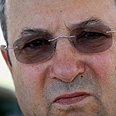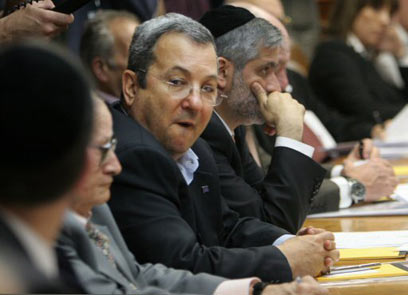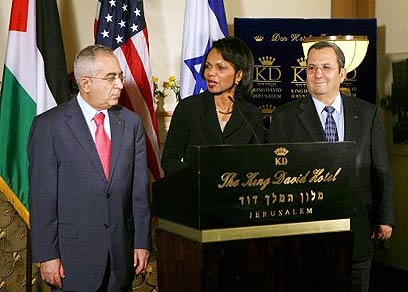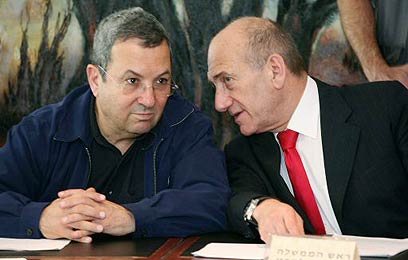
Barak: Nothing can destroy Israel
Labor Chair and Defense Minister Ehud Barak gives Yedioth Ahronoth exclusive interview – the first since he took office eight months ago. 'Compared to other politicians, I guess you can say I'm naïve,' he admits
Good news first – Israel is under no existential threat. Not yet anyway. According to Labor Chief Defense Minister Ehud Barak. Israel is the strongest nation in the Middle East and will remain so in the foreseeable future; but that doesn't mean there are no challenges ahead.
This is the first official interview Ehud Barak has given since he was named defense minister eight months ago – an oddity of itself: You might think you see and hear him all the time, but the fact is we know very little about the positions of the man heading on of the most influential establishments in our lives.
That could also explain why, in spite of the fact that he holds a position which usually contributed to ones popularity, his public standing as a premiership contender has slipped steadily. He now only has somewhere between 15% and 22% approval rate.
We arrived at the Defense Ministry just one day after a mother and her four children were killed in the Gaza Strip, presumably by IAF fire.
Why won't Israel apologize for the death of the Abu Meatak family? What's the harm in repenting?
"We hold Hamas responsible for what goes on in Gaza," answered Barak. "Hamas is in control over there. Israel maintains it has no interest in harming innocent people and we regret every case where women and children get hurt during IDF operations. But we can't let ourselves get confused: We feel for every bit of suffering we see in Gaza and in other places, but we hurt for those hurt on our side, in Sderot, in Ashkelon and in the Gaza vicinity communities."
In a recent cabinet meetings, (Internal Security) Minister Avi Dichter said that the people of Ashkelon are treated like perishable equipment.
"I didn't hear him say that, but in any case, I don't think anyone is treating the residents – who have truly been in a dire situation for a very long time – like perishable equipment. We're in a war zone and the challenge is a big one. I can’t promise everything will get better today, but I can tell you this: Israel's finest are fighting this battle and we will see peace and security in the area again.

Working on a solution. Barak at a cabinet meeting (Photo: AP)
Will the solution be a political one or a military one?
"Eventually, I can't see us reaching a solution without exercising some sort of force. We're not gung-ho to go back into Gaza, but If reality calls for it we will do everything we have to in order to ensure peace; now, we're not talking about a one-time deal. This is another test Israel has to pass and I call on all of us to push forward undeterred."
So how do we deal with the military buildup in Gaza?
"We've already been inside Gaza, and while we were there Qassams were fired and the armament was ongoing. We might have to go back into Gaza – we have to be ready for that. We're not thrilled about it, but if and when we decide to do it, the operation won't resemble the Second Lebanon War.
"Israel is the strongest nation in the Middle East, but we have to apply our strength wisely. War is no picnic. Wars should be prevented and if you can't prevent them you have to put them off. If war is forced on us, we have to be able to win it quickly, unequivocally, on enemy soil and without any damage to the home front."
That sounds like harsh criticism of the last war.
"It is. And if you ask me what we've been doing since the last war, the answer is we have learned quite a few lessons during the war… we're pushing a perennial program headed by the chief of staff and a new chain of command was named of officers who understand post-war realities.
"But the real answer is in training. Training, training and more training in a scope I can't ever recall before. We are short NIS 2 billion (approx $581.81 million) every year and we intend to fight to get them back."
And should war break out, is the military ready?
"We are more ready than ever before, even if we have to face a combined front. Then again the other side has discovered that our home front is vulnerable – which takes us back to my original premise – wars should be prevented."
The lack of partners in peace
Barak may talk about the need to postpone the next war, but the contentions against him are that he does not do enough to push the peace negotiations with the moderate Palestinians.
Barak contradicts: "First of all, I am deeply committed to reaching an agreement with the Palestinians and I support the process wholeheartedly. I think I'm probably the only one that doesn't have to prove how far he's willing to go, including taking personal and political risks, to give things a chance."
That may be so, but you're still the government's rightist marker.
"I don't think it's a question of who wants peace more, or who is willing to do more for it. There are some differences emanating from the realm of my responsibilities. The political leadership is responsible for protecting the identity of the State of Israel and bringing about the reality of two states for two peoples.
"However, I am responsible for the safety and security of Israel and its citizens, so naturally I'm the one who stresses these elements. The real world makes you make some harsh decisions, but if an when a Palestinian partner presents itself…"
What do you mean "if?" don't we have a Palestinian partner?
"Let me finish – when we have a partner we feel we can reach an agreement with, we will face some difficult decisions; but discussing such decisions today is wrong – it is done hastily, superficially and doesn't do any good."

True partners? With Palestinian PM Fayyad and Condoleezza Rice (Photo: AP)
So we ask again – do we or don't we have a peace partner?
"I think every generation has partners who face certain limits and certain advantages."
Is Abbas a partner?
"Absolutely. The Israeli government, which I am somewhat of a senior member of, is negotiating with him."
It looks like you don't really believe in the (Egypt-Hamas) Cairo talks.
"We do not negotiate with Hamas. It is a murderous organization which clearly states it has divine orders to obliterate Israel and kill Jews. It's hard to imagine that talking with such a group is an option."
We ask again: Egyptian Intelligence Minister Omar Suleiman is expected to come to Israel to present a six-month ceasefire plan in exchange for opening the Gaza crossings. What will you say to him?
"We still have two matters which we are indirectly discussing with them – Gilad Shalit and various humanitarian issues in the Gaza Strip."
And?
"I will not discuss future hypothetical situations. As I've told you, I think that we will encounter several escalations en route to peace. I suggest no one put their faith in any angels descending form the heavens with the promise of truce."
Catering to public opinion
Barak is no stranger to political risks, so it seems that his reluctance to reveal anything is not based on the lack of courage, but rather on strategy or tactics, if you will. Even when it comes to his views, he seems adamant to keep confusing the enemy.
As the defense minister, why won’t you order the release of Marwan Barghouti?
"I really can't sympathize with the whole Barghouti issue. This is a man who was sentences by the Israeli courts to five consecutive life terms for murdering Jews. Past governments have created a reality in which certain Israelis, serious people, are talking to him. I'm not convinced that courting an arch-killer was such a stroke of genius.
"(The Palestinians) have an elected president and he is the man Israel is negotiating with – as it should be. As long as we are not convinced that we made a mistake be sending him to jail, we have to curb out enthusiasm."
And when Abbas is no more, how long would it take Hamas to take over the West Bank?
"One of the lessons learned in the Middle East is to never try to anticipate the other side's moves. I hate to remind you that 20 years ago we supported the induction of Hamas, that we marched into Lebanon to the sounds of the Lebanese people cheering and it was our being there that created Hizbullah.
"I'm not even sure that the last war was something the government wanted, or intended or even imagined; or if it was a case of retroactively defining goals; but the result is that the Hizbullah has only become stronger since the war."
Since the Second Lebanon War?
"Yes. When we left Lebanon in 2000, they had 6,000, maybe 7,000 rockets, but we had six quiet years. When the war broke out in 2006, they had 14,000 rockets, some ranging to Hadera. Now they have 40,000 rockets that can reach your house, here (the Defense Ministry's Tel Aviv HQ) and Dimona; so we have to stop thinking that freeing Barghouti and striking Hamas will result in a truce. We have to focus on the things we can change and help any positive factor in the area."
So what are you doing to help the Palestinians? You could have ordered the removal of checkpoints and outposts, push financial initiatives – nothing has been done since you took office.
"I categorically disagree. There has been a huge boost since I took office. Things which have been stuck for years are moving ahead and new projects are being devised. There are 16 major checkpoints in the West Bank – we've removed two and are in the process of removing the third. More may follow, but you have to understand that these checkpoints are directly linked to our security infrastructure. That is how we protect the citizens of Israel."

Good working relations. With Olmert (Photo: Reuters)
But can you honestly say you're doing everything you can to help the moderate Palestinian forces?
"Absolutely, of course; with one exception – the safety of Israeli citizens."
What about all the illegal outpost?
"Of all illegal outposts, three or four have been taken down. It's a dialogue. The one (outpost) we would like to avoid a future confrontation about is Migron. We have several dozen families to take care of and down the line – if and when we come to an agreement – we'll have to move many more. It won't be an easy task, and I don't think we're looking forward to it. These people are not our enemy, they're our flesh and blood. Sure, we disagree with them, but they are our brothers."
'According to foreign reports...'
What about the Syrians, we asked. If negotiations were to begin tomorrow, would they be picked up from where they were left off in 2000?
"No. Too much has changed. Syria was not affiliated with Hizbullah back then; Hamas wasn't ruling Gaza and Syria was headed by a different man. Any prime minister, left-winged or right, knows that when the moment, the chance for real peace comes, there will be some difficult concessions to make."
Are you or aren’t you in favor of peace negotiations with Syria?
"Israel has a first-class interest in seeing Syria out of the axis of evil."
Even before any agreement is struck with the Palestinian?
"Not necessarily, no. We are in the midst of negotiations with the Palestinians. It wouldn't be right to stop everything just because there's someone else to talk to. I dream of a situation in which we will be able to harness the moderate Arab world into a broader concept (of peace). There lays the real common interests – in the Arab world which is threatened by a hegemonies Iran reaching for nuclear weapons. I give this matter a great deal of thought."
Are you for ceding the Golan Heights in exchange for a comprehensive peace with Syria?
"We have an interest in seeing Syria out of the axis of evil and that won’t come without a price… We all remember the threat we were under before we took the Golan and we can assume it might present itself again."
Where does the negotiation with Syria stand?
"There's no negotiation to speak of. There are some talks to determine whether or not any overtures can be made... We have to find these things out first, because both sides have a lot to lose.
"In any case, I think we should free ourselves of the need for normalization. Israel has a silent majority – 80% – thinks that if both sides agree to put an end to the feud, it should be done, even if painful concessions are required."
Are the foreign reports suggesting you were against Israel's actions in Syria true?
"We can't publicly speculate about actions that may or may not have been carried out. All I can say is that no Israeli soldier, no unit, aircraft or vessel can set foot on enemy territory without the explicit authorization of the defense minister."
We tried asking if the same thing we can't speculate about can be done in Iran, but Barak was reluctant.
"There is a lot we are doing regarding Iran and there's a lot more that needs to be done when it comes to intelligence and imposing sanctions. We keep saying that all options must remain viable. The only thing we shouldn't do is talk about it."
Is there any chance Iran might change its policy towards Israel?
"I don't think the ayatollahs will be there in 10 years, but I don’t know what next year or the next nine will bring. It's an unstable regime filled with social unrest… I don't think they'll be there in a decade, but if they're not stopped they could reach nuclear capability."
Are we ready for the time when we will have to deal with them all by ourselves?
"The defense minister of Israel cannot afford to answer such a question. I say again – Israel in the strongest nation in the Middle East, surely within 1000 miles… there is no power out there that could destroy the State of Israel, but that doesn't meet we can stop being vigilant."
The team player
How involved are you in political decisions, we asked; does Olmert involve you in things?
"Contrary to popular belief, the prime minister and I have a very good working relationship, as we should and I'm highly involved. I know how to work with people. I'm a team payer."
You? A team player?
"Yes, yes," he laughs. "I can work with people. I've spent dozens of years in systems that require vast cooperation. I wouldn't be where I am if I weren't a team player."
And yet, you seem to antagonize the public, your own party even.
"I disagree. In certain moments in time, the media reflection of me may evoke criticism, but leadership doesn’t grow from love. It needs respect. In any case, I have my share of advisors."

'Leadership doesn't grow from love.' In a Labor convention (Photo: Maya Dagan)
Labor members say you've changed and not for the better.
"I can't say I've changed, but I can say I'm learning. I understand that politics requires compromise, a little give-and-take… I'm probably less suspicious than others, and with all my years of experience I can say I'm still a little naïve."
Wait just a minute – Barak? Naïve?
"I'm somewhat easier to maneuver politically than a lot of the more experienced political players. Some of the things that happened to me wouldn't have happened to other players."
Are you sorry you didn't resign form the government after the release of the Winograd Report?
"I was very close to resigning after the report. I was six months into the job, submerged in urgent matters. I consulted with a lot of people whose opinion I respect and after much deliberation I realized that the responsible thing to do was to stay. I knew I would be criticized by the media, and I even accept some of that criticism, but I did the right thing. I don't regret it."
Is Labor planning to leave the government?
"We don't have any grand plan to dissolve the government, but we have to be realistic. Any party leaving the coalition could potentially bring about new elections. We have no such plans at this time."
You can't really believe Labor is in any position to win an election.
"I don't know what 'ever' means. We have our ups and downs. Netanyahu came out of the last elections with only 12 mandates and today's polls double his strength. Things change."
What about joining forces with Kadima?
"There's no such plan at this time."
What is your quintessential Israeli moment?
"Choosing the national bird. I chose the Red Falcon (Lesser Kestrel, or Falco naumanni)."
He initially chose the Peres (Bearded Vulture) he said, and then was told they were an endangered species. "There's nothing endangered about the Peres I know."










